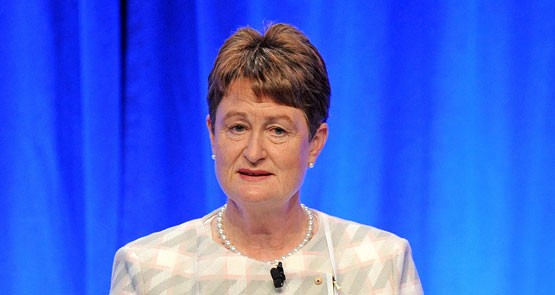
As chair of the Business Council of Australia, Catherine Livingstone was full of advice for politicians about how to lead properly. “Leadership is a collective responsibility,” she told a BCA dinner in 2015. “Leadership is a collective dynamic,” she told the National Reform Summit earlier that year. And transparency was important, too. Leadership should be characterised by “consistency, respect and transparency”.
And the BCA led the charge in demanding an Australian Building and Construction Commission and attacking the CFMEU for what it claimed was a reign of lawlessness in the construction industry. “What kind of society will we have if everyone can simply choose to ignore any laws they don’t like?” said BCA boss Jennifer Westacott earlier this year. “All citizens, and especially those of us who are community leaders, have a responsibility to abide by the law and set an example for others.”
All of which makes for uncomfortable reading given the behaviour of one the BCA’s most prominent members, the Commonwealth Bank, of which Livingstone has been chair since January, and of which CBA boss Ian Narev is a director.
This morning Livingstone released a statement about CBA’s handling of the money laundering scandal, following the wrist-slap bonus cuts revealed yesterday. The bank has been desperately downplaying systemic breaches of anti-money laundering laws that enabled drug syndicates to launder tens of millions of dollars over three years as a single coding error, while the bank ignored repeated and urgent warnings from police and even its own internal alerts.
[Dr Phil should direct his comment on wage growth elsewhere]
Livingstone’s statement today raises more questions than it answers. She says the bank has been taking action “since the second half of 2015, when the alleged issues relating to Threshold Transaction Reporting (TTRs) in the Intelligent Deposit Machines (IDMs) were brought to the Board’s attention”.
In which case, given how important transparency was to Livingstone when she was lecturing the rest of us about leadership, one hopes that she has savaged her board colleagues and the bank’s executive team for the lack of disclosure of what the bank surely knew was a “significant” (her word today) issue.
And if the bank had been taking action since the second half of 2015, why did the Australian Federal Police raid the bank in April 2016? Clearly whatever action the bank had been engaged in — by that time, up to six months — the coppers were decidedly unimpressed.
[Are nasty, aggro unions creating havoc for Aussie businesses? Well no, not really.]
Livingstone also says the bank “promptly [fixed] the coding error relating to the IDM TTRs”. But as IT News pointed out yesterday, Austrac’s statement of claim notes that the error wasn’t fully fixed for two years.
And the bank “[changed] senior leadership in the key roles overseeing financial crimes compliance”. Did that mean sacking people? Or were those responsible simply transferred elsewhere? More to the point, if “leadership is a collective responsibility”, why hasn’t the CEO, and the board directors who were in place at the time, also been “changed”? Or is leadership only collective in the good times?
The fact is, the CBA is alleged to have done exactly what Westacott railed at — simply choosing to ignore laws it didn’t like. The bank was too lazy, and too relaxed about a hitherto-timid regulator, to bother making sure its systems were compliant with anti-money laundering laws, thus helping drug dealers and, potentially, terrorists.
Perhaps at the BCA, breaking the law is the lurid image of a CFMEU bikie engaging in standover tactics on a building site, rather than a bank executive in an office ignoring system alerts about transactions, or AFP emails warning that accounts were being used for money laundering. But what would happen if terrorists used the CBA to fund an attack? it would make the allegations against CFMEU members — which, oddly, seem to repeatedly fail in court — look tame.
So much for “setting an example for others”.








There should be no need for the expression ‘best practice’. Businesses which boast of it tend to make me dubious.
It’s always “Do as I say – and I’ll do as I like” with these overpaid, under-achieving supercilious silly-arses.
There are a lot of red light warning phrases like “best practise” – “trust me”, “believe me”, “honestly, I swear”, “I’m looking for your vote”, “I’m from the government and I’m here to help” etc all of which should blow the fuses of a B/S detector.
“As I recall”, “It’s my understanding”, “As I’ve been told” = up to the interviewer to show how much they know, and correct them, or let them continue on their prevaricating way.
“I’m a strong leader.” – The illustrious leader of the strong and united government, Hon Fluffy Spiv-bull
Ever since Labour joined the coalition on the path to US style economic enlightenment, we have seen ethical boundaries alarmingly frayed, to standards we would not have tolerated 20 years ago.
Big business response now to any questioning of their behaviour, (as in this case), seems to consist of oops sorry but.. well, f… off!
Where does all this end up, with a wealthy incompetent buffoon like Trump running the country, whose attempts to use his f… you business approach to government have failed dismally.
But wait – is it possible we have one already?